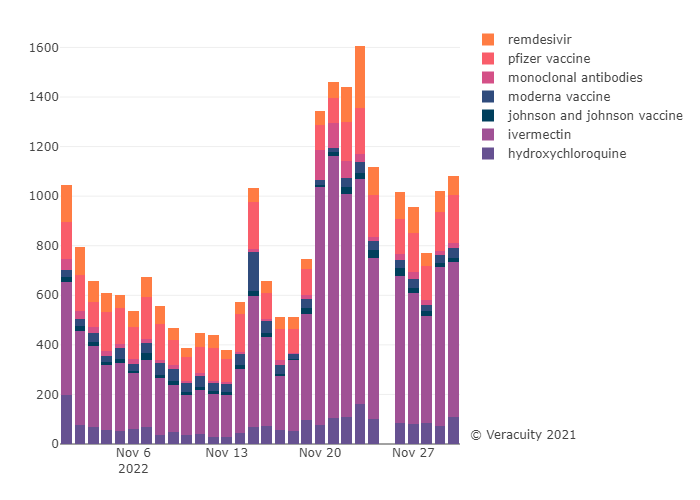Daily sentiment
Net daily sentiment ranged from -53.96 for Monoclonal antibodies on Friday the 18th to 46.03 for Moderna vaccine on Friday the 11th.
The sentiment for each tweet is scored from -1 (most negative) to +1 (most positive) using VADER sentiment analysis. Net sentiment is calculated by summing the sentiment across all tweets for a given day and/or category, then normalizing the score by the number of tweets.
Medical conditions from the MedDRA dictionary
Infection was the most frequently observed medical condition mentioned. Infection had the highest overall net sentiment of -1.17. Poisoning had the lowest net sentiment this week (-49.87).
| medical condition | count | sentiment |
|---|---|---|
| Infection | 603 | -1.17 |
| Sickness | 397 | -30.18 |
| Flu | 366 | -28.82 |
| Cancer | 229 | -38.24 |
| Poisoning | 167 | -49.87 |
| Coldness, Cold | 156 | -12.04 |
| Forgetfulness | 146 | -7.45 |
| Blindness, Blind | 131 | -10.49 |
| Inflammation | 129 | -20.60 |
| Pneumonia | 109 | -26.74 |
MedDra is a standardized medical terminology developed by the International Council for Harmonization Cross-referencing tweets against this list is a starting point for identifying medical conditions mentioned in tweets.
Cross-referencing the MedDRA dictionary by sentiment and topic
Positive tweets:
There were 797 tweets with an strong positive sentiment. The top 10 most frequent medical conditions mentioned within these tweets were (1) Infection, (2) Sickness, (3) Flu, (4) Coldness, Cold, (5) Blindness, Blind, (6) Forgetfulness, (7) Cancer, (8) Pneumonia, (9) Fall, (10) Fever. Of these terms, Fall (n=23), Fever (n=23) were not in the top 10 most frequent terms across all tweets.
Negative tweets:
There were 1639 tweets with an strong negative sentiment. The top 10 most frequent medical conditions mentioned within these tweets were (1) Sickness, (2) Infection, (3) Flu, (4) Cancer, (5) Poisoning, (6) Inflammation, (7) Kidney failure, (8) Blindness, Blind, (9) Pneumonia, (10) Coldness, Cold. Of these terms, Kidney failure (n=61) were not in the top 10 most frequent terms across all tweets.
Word-level analysis
The 25 most important words within positive tweets (compared to negative and neutral) tweets are shown in the treemap below. The size of each box represents the weighted score of each word. The word “like” within the search for “Ivermectin” had the highest overall weight. When the words are summed for each topic, Ivermectin had the highest overall weight.
The 25 most important words within negative tweets (compared to positive and neutral) tweets are shown in the treemap below. The word “lie” within the search for “Ivermectin” had the highest overall weight. When the words are summed for each topic, “Ivermectin” had the highest overall weight within negative tweets.
This analysis of words evaluates the stemmed version of words using the Snowball algorithm. By stemming words, words with similar meaning, such as pain, painful & pained, are grouped together as simply “pain”.
Beta: text classification
Tweets that describe adverse events/side effects (first person point of view)
| tweet | search topic(s) | medical condition(s) mentioned |
|---|
This classifier was trained on a set of tweets manually reviewed and tagged. The classifier was trained using GloVe, a pretrained word embedding layer.
References
Webpage created in R version 4.1.0 (2021-05-18) and R Studio (Version 1.4.1717) using the following packages: plotly, kableExtra, formattable, treemap, and wordpressr.
- C. Sievert. Interactive Web-Based Data Visualization with R, plotly, and shiny. Chapman and Hall/CRC Florida, 2020.
- Hao Zhu (2021). kableExtra: Construct Complex Table with ‘kable’ and Pipe Syntax. R package version 1.3.4.
- Kun Ren and Kenton Russell (2021). formattable: Create ‘Formattable’ Data Structures. R package version 0.2.1.
- Martijn Tennekes (2021). treemap: Treemap Visualization. R package version 2.4-3.
- Simit Patel (2021). wordpressr: An API Wrapper for WordPress Site APIs. R package version 0.1.0.
- WHO COVID-19 Dashboard. Geneva: World Health Organization, 2020. Available online: https://covid19.who.int/ (last cited: Dec 16, 2022).
- Hutto, C.J. & Gilbert, E.E. (2014). VADER: A Parsimonious Rule-based Model for Sentiment Analysis of Social Media Text. Eighth International Conference on Weblogs and Social Media (ICWSM-14). Ann Arbor, MI, June 2014.
